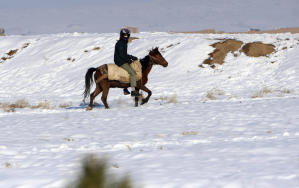 Out of all the revelations brought to light by the latest WikiLeaks dump, one in particular seems the odds-on favorite for a Hollywood adaptation. That would be the saga of Hossein Ghanbarzadeh Vahedi, an American held against his will by Iranian authorities. He carried out a daring nighttime escape on horseback.
Out of all the revelations brought to light by the latest WikiLeaks dump, one in particular seems the odds-on favorite for a Hollywood adaptation. That would be the saga of Hossein Ghanbarzadeh Vahedi, an American held against his will by Iranian authorities. He carried out a daring nighttime escape on horseback.Vahedi, a 75-year-old dentist who fled Iran amid its 1979 Islamic revolution and became an American citizen, returned to his homeland in May 2008 to visit his ancestral home and the graves of his parents. But when he attempted to return to the United States, officials at the airport in Tehran confiscated his passport and took him into custody. According to the cables, Iranian officials gave him two demands in exchange for his passport and freedom: $150,000 in cash and an assurance that his two sons who worked as music-industry executives wouldn't represent any musicians the country deemed "anti-regime."
"According to Vahedi, while the singers are simply Persian pop singers, they have gotten crowds riled up with occasional anti-regime rhetoric," says the cable recounting Vahedi's saga. "Also included in these performances are female dancers whose costumes would not raise an eyebrow in most countries, but are perceived as immoral by the conservative elements inside Iran."
And so it came to pass that Vahedi turned up at the U.S. Embassy in Ankara, Turkey, on Jan. 9, 2009, after he'd paid two guides $5,000 to lead him over a treacherous, freezing mountain landscape to escape Iran on horseback. Once he made it across the border, Vahedi paid $2,500 for overnight shelter, food and a ride to a bus station. There, he embarked on the 10-hour bus ride to Ankara, where American officials secured him a flight home.
But he almost didn't make it. According to the cable, Vahedi's guides had to "physically hug him to keep him warm" at one point during the daring 14-hour excursion. He also became disoriented and fell off his horse at one point, leading him to believe that "he was going to die by freezing to death on a mountainside."
Vahedi's escape was dramatic, but it was hardly the first time anyone has risked life and limb across treacherous mountains to escape the clutches of the Iranian government. Indeed, Vahedi indicated in the cable that the horse he was on seemed to know exactly where to turn along the route without direction from the guides. Perhaps, he speculated, it had made the trek on earlier occasions, to aid in human escapes or to help smuggle drugs.


